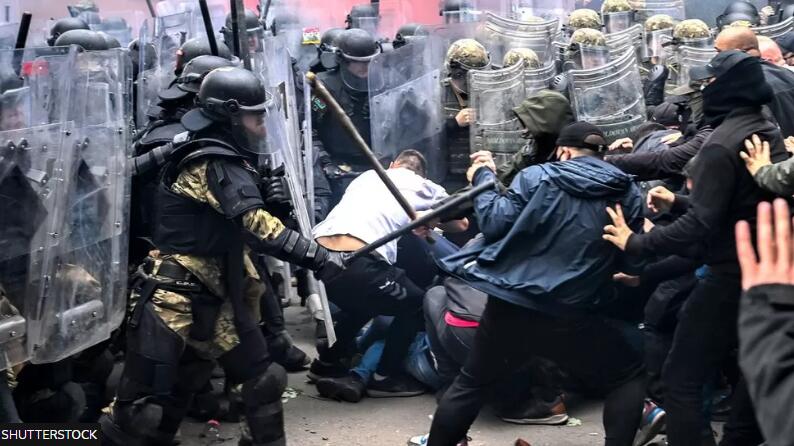
Kosovo: Fresh clashes as Nato troops called in to northern towns
Nato has condemned as “totally unacceptable” attacks by demonstrators in Kosovo that left some 25 of its peacekeepers injured.
Police and Nato troops clashed with Serb protesters in the north where there has been unrest over the installation of ethnic Albanian mayors.
Tear gas and stun grenades were used to deter protesters in Zvecan, after they tried to invade a government building.
Nato soldiers also formed a security cordon around two other town halls.
The crisis dates back to April when Kosovo Serbs boycotted local elections, allowing ethnic Albanians to take control of local councils with a turnout of less than four per cent.
Both the EU and US have criticised the Kosovan authorities for destabilising the situation in north Kosovo, and warned against any actions that could inflame ethnic tensions there.
Kosovo declared independence from Serbia in February 2008, after years of strained relations between its Serb and mainly Albanian inhabitants.
It has been recognised by the United States and major European Union countries, but Serbia, backed by its powerful ally Russia, refuses to do so, as do most ethnic Serbs inside Kosovo.
While ethnic Albanians make up more than 90% of the population in Kosovo as a whole, Serbs form the majority of the population in the northern region.
Peacekeepers from Italy and Hungary were among those hurt in the latest violence on Monday, with three of them left in a serious condition, Nato said. Five people have been arrested in relation to the attacks.
Serbian President Aleksander Vucic said more than 50 Serbs had needed hospital treatment and that even more were injured.
Protesters were outraged not just that ethnic Albanian mayors had taken office, but by the heavy-handed actions of Kosovo police, who turned up with rifles and armoured vehicles.
Further provoking them was the fact Serbian flags had been removed from municipal buildings and replaced with Kosovo flags.
Kosovo’s prime minster, Albin Kurti, insisted the security forces were merely ensuring that democratically elected mayors could represent their constituents.
But he has been accused of trying to create chaos for everyone in the region by trying to install leaders who do not have a credible mandate.
“Do not allow those fake mayors to enter here because they won 50 votes,” said Igor Simic, the deputy head of the Serb List, the biggest Kosovo Serb party backed by the government in Belgrade.
“Even Albanians are not voting for it.”
The worst incidents of violence on Monday were in Zvecan. A crowd gathered at the municipal building early in the morning. They were hoping to prevent the new, ethnic Albanian mayor from entering the building.
The Nato-led troops at first tried to separate protesters from the police, but later dispersed the crowd using shields and batons, AFP news agency reported.
Several protesters threw rocks and Molotov cocktails at the soldiers, the agency said.
Kosovo police said one of their cars was set on fire and that “provocative captions with Serbian and Russian symbols” were written on other vehicles.
Nato called the attacks “totally unacceptable”, adding in a statement that it called on all sides to “refrain from actions that further inflame tensions, and to engage in dialogue”.
Mr Vucic put the army on the highest level of combat alert in response to the fresh protests. He moved army units close to Kosovo’s border on Friday, following similar clashes.
The recent disorder began after Kosovo Serbs – who account for about 5% of the country’s 1.8 million population overall – boycotted April’s local elections in four northern municipalities that are majority Serb. This allowed ethnic Albanians to take control of the councils.
Belgrade backed the boycott – resulting in a turnout of just 3.47% – which was sparked after the Serb community demanded the establishment of a promised association of Serbian municipalities.
Despite its support for Kosovo, Both the EU and US have criticised Pristina for destabilising the situation and urged the authorities to “de-escalate”. This advice appears to have fallen on deaf ears.
Comments (0)